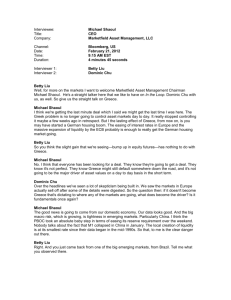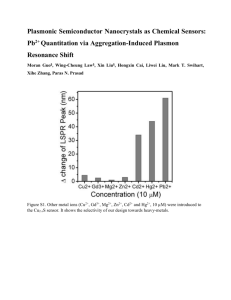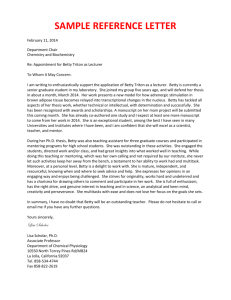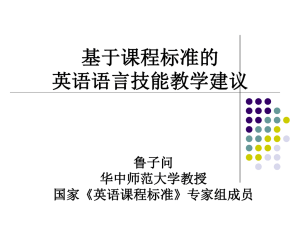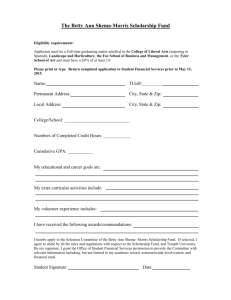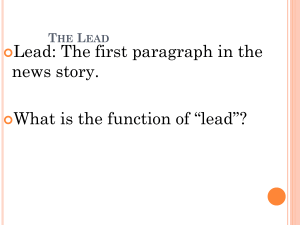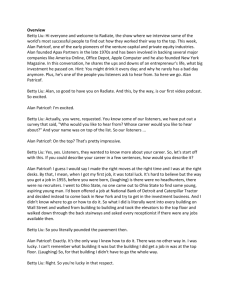Michael Shaoul - Bloomberg TV Interview Transcript
advertisement
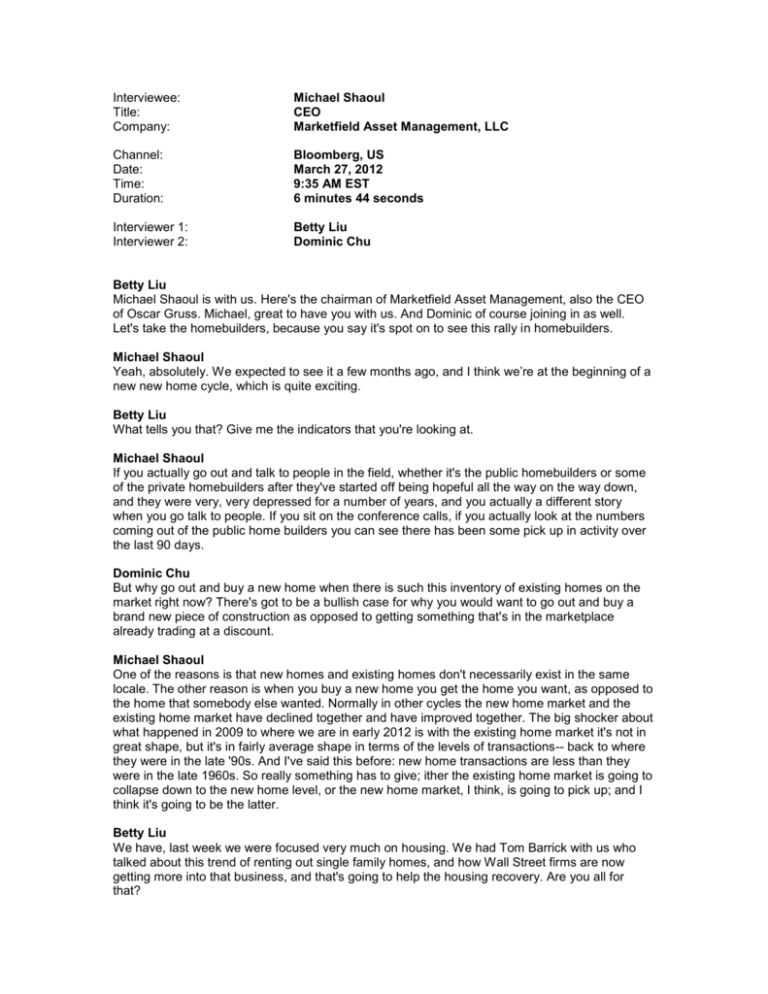
Interviewee: Title: Company: Michael Shaoul CEO Marketfield Asset Management, LLC Channel: Date: Time: Duration: Bloomberg, US March 27, 2012 9:35 AM EST 6 minutes 44 seconds Interviewer 1: Interviewer 2: Betty Liu Dominic Chu Betty Liu Michael Shaoul is with us. Here's the chairman of Marketfield Asset Management, also the CEO of Oscar Gruss. Michael, great to have you with us. And Dominic of course joining in as well. Let's take the homebuilders, because you say it's spot on to see this rally in homebuilders. Michael Shaoul Yeah, absolutely. We expected to see it a few months ago, and I think we’re at the beginning of a new new home cycle, which is quite exciting. Betty Liu What tells you that? Give me the indicators that you're looking at. Michael Shaoul If you actually go out and talk to people in the field, whether it's the public homebuilders or some of the private homebuilders after they've started off being hopeful all the way on the way down, and they were very, very depressed for a number of years, and you actually a different story when you go talk to people. If you sit on the conference calls, if you actually look at the numbers coming out of the public home builders you can see there has been some pick up in activity over the last 90 days. Dominic Chu But why go out and buy a new home when there is such this inventory of existing homes on the market right now? There's got to be a bullish case for why you would want to go out and buy a brand new piece of construction as opposed to getting something that's in the marketplace already trading at a discount. Michael Shaoul One of the reasons is that new homes and existing homes don't necessarily exist in the same locale. The other reason is when you buy a new home you get the home you want, as opposed to the home that somebody else wanted. Normally in other cycles the new home market and the existing home market have declined together and have improved together. The big shocker about what happened in 2009 to where we are in early 2012 is with the existing home market it's not in great shape, but it's in fairly average shape in terms of the levels of transactions-- back to where they were in the late '90s. And I've said this before: new home transactions are less than they were in the late 1960s. So really something has to give; ither the existing home market is going to collapse down to the new home level, or the new home market, I think, is going to pick up; and I think it's going to be the latter. Betty Liu We have, last week we were focused very much on housing. We had Tom Barrick with us who talked about this trend of renting out single family homes, and how Wall Street firms are now getting more into that business, and that's going to help the housing recovery. Are you all for that? Michael Shaoul Absolutely. I have clients who have done it. I've advised them on how to do it. I was a real estate guy before I was a Wall Street guy. I think it's one of the most interesting investment opportunities out there. It's very time consuming, so it's not an easy thing to do. But if you have the time and the aptitude to manage real estate, the yields on single family homes are astonishing value in today's environment. Betty Liu Is that something that you're buying yourself? Michael Shaoul No. I mean, I have a day job. I have two day jobs, so it's not for me. But if I was in a different situation, yeah, I absolutely would have flown out to a municipality like Detroit 18 months ago and started doing it. Dominic Chu Look at the overall picture here for real estate. It's not just about the housing industry, it's also about it plays into the overall economy. It's one of the number one concerns right now. Is there a reason why-- is there a bear case right now for the markets? We've been talking about this run for a while for stocks. Is there a reason why people should be cautious right now, given the run-up? Michael Shaoul I don't think they should be cautious about U.S. domestic activity. I mean, we may get some data shocks. Everybody talks about the seasonal adjustments getting more difficult in the Springtime. So maybe we'll have some bad data at some point in the next 30 to 60 days. The real dangers, I think, are that interest rates start moving higher—you asked the right question just before I went on, which is: how long can the bond market have a bid and how long can the equity market have a bid?—and I think in the end, I think the bond market is going to give way, and that will pull some pressures. And the other problem, I've said it time and again, lies well outside the United States on the other side of the world, particularly in China, particularly in India, and some kind of a problem in emerging markets derailing this recovery, rather like Europe did last year. I would say recovery in the equity market, rather than equity in the economy. Betty Liu So a pullback is what you're saying, rather than generating from the emerging markets. Michael Shaoul Yeah, eventually—but I'll say this: this long powerful run in the U.S. equity market is typical of the bull market. Bull markets do not make it easy for people to invest, and they just keep on going and leave people sitting on the sidelines, and then as people pile in things get difficult again. Betty Liu Would you’re saying-- we have the chart there, the total return index—the S&P total return index—which is basically near an all time high. You're saying, as an indicator of this huge rally that-Michael Shaoul Yeah. If you went back five years you'd see it's within two points of an all time high as we talk. So I mean, you pretty much filled the entire drawdown in the 2007-2009 bear market if you just sat and bought and held the S&P over that period of time. Now since 2007, you've had something like $475 billion leave long-only U.S. equity funds. This is an incredible disparity between how, particularly, retail investors have behaved over the last five years, and what the market has actually done. Betty Liu It is incredible. Dominic Chu Does it scare you that this huge move higher—this doubling in the market since the lows—has not scared people back into the market? Michael Shaoul No, it doesn't scare me. It encourages me. This sort of denial about the first two or three years of a bull market is typical of what happened. People didn't get excited about emerging markets until 2005, 2006. And every time they went up and came down, people said, there you are. You missed it. Betty Liu Michael, let me just bring you back housing, I want to bring you back to that news of about an hour ago, Kay Schiller. Looking at Kay Schiller numbers. I've always been puzzled by them as well, because they're a very old number for a market like this. But we still pay close attention to them. Michael Shaoul I don't. I always tell people that the Kay Schiller index did not go down on a year over year basis until February 2007. So if you sat around waiting for Kay Schiller to tell you have a problem, you would look pretty late in the day. It's a fine index; it does what it does. But what it measures is basically deals which took place four to five months ago, and that's very, very old data by the time it comes out. Betty Liu So then for you, the most important piece of data on housing is what then? Michael Shaoul Transactions. All I really care about is the number of transactions taking place. And I wouldn't simply rely on official data, particularly in the new home market, where it's census bureau data. You need to go beyond that. You need to actually look at what the public home builders are reporting in their quarterly earnings, and they're getting better. Betty Liu And would you say as investors who are looking at buying homebuilders, would you say across the board they are good bets? Michael Shaoul I would stick to the ones which have managed to execute well. I always say at the beginnings of the recovery stick to the guys who have worked out how to make their operations make sense in the new environment. There are some homebuilders which are still in the middle of trying to work that out. I would leave those aside. Betty Liu So you're talking about Lennar? You're talking about who? Michael Shaoul You know, I hate giving names, but it's pretty obvious when you look at the charts. The ones which have gone off a lot are actually the ones you want to own. Dominic Chu Including Lennar, by the way, which has gone up quite a bit this year, Betty. Betty Liu It has indeed. Alright, thank you, Michael. Michael Shaoul Thank you. Betty Liu Great to talk to you again. Michael Shaoul of Marketfield Asset Management. Important Disclaimer Although strenuous efforts are made to ensure the accuracy of interview transcripts, Executive Interviews and its associated companies accept no liability for what is said, for any discrepancy between the spoken and written word, or for any errors and omissions. Where doubt arises, please refer to the original broadcast video interview.
